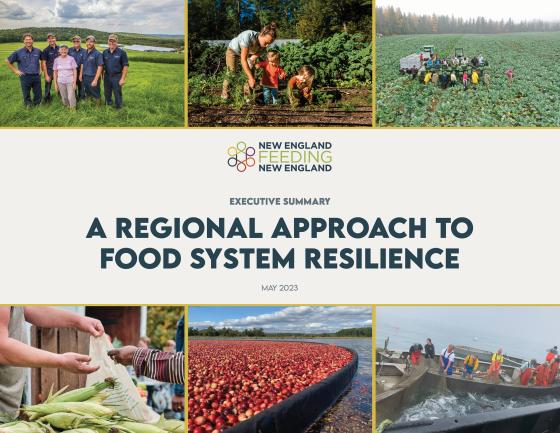Posted June 5, 2023 at 04:35pm by Kelly Nottermann
Can New England Feed Itself in the Years to Come?

New England Food Advocates Release New Research on the State of the Region's Food System:
Report shows Vermont stands to benefit economically as New England states coordinate to make food system more self-reliant
A new report puts forth a regional goal of producing and consuming 30% of New England’s food needs in the region by 2030. Commissioned by the New England State Food System Planners Partnership, a collaboration between Vermont Farm to Plate, five other state-level organizations and Food Solutions New England, it outlines the role New Englanders can play in making the region’s food system stronger and more self-reliant. The report - A Regional Approach to Food System Resilience - is a product of 16 researchers exploring the opportunities and needs along the food supply chain in New England, and highlights the land, sea, and labor needs of the region, consumer purchase metrics, distribution trends, and population projections that will impact the region’s ability to feed itself in the coming years.
“Becoming more self-reliant requires expanding our food supply chains, building up our infrastructure, and retaining control of our land resources,” said Ellen Kahler, Executive Director of the Vermont Sustainable Job Fund. “For our New England neighbors to be less reliant on a global food supply, they must rely on their neighbors where production is more plentiful. With additional private and state investment, much of the infrastructure needed to reach regional long-term goals could find a home here in Vermont, especially in the areas of vegetable and fruit production and meat processing. That means more food production, jobs, and farm and food businesses here.”
The report illustrates that opportunity. Vermont is home to only four percent of the region’s population, but more than 30% of its agricultural land. As a result, despite its small proportion of New England’s population, Vermont is home to more than six percent of food system employment and 7.5% of its sales, a $3.3 billion economic industry for Vermont. This could grow even larger. In contrast, a state like Connecticut is home to 24% of the region’s population but only 10% of its farmland, ensuring that in order to make its food system more reliant on local food, it must capitalize on available production capabilities of nearby states – such as Vermont.
“The gap between what Vermont produces and what it consumes can be exported to support our economy, jobs, and our communities. We can rely on an unstable and unpredictable global supply chain or feed our neighbors right next door here in New England,” said Jake Claro, Vermont Farm to Plate Director. “Together, we can implement the 2021-2030 Vermont Agriculture & Food System Strategic Plan and continue strengthening local farms and food businesses, be less dependent on a global food supply, and expand access to agricultural land so more of the food consumed here and across New England is produced here.”
New England states had a total food expenditure of over $87.1 billion in 2019, or about $5,868 per person in the region. In order to ensure that 30% of New England’s food needs are met with New England products, the average New Englander would have to spend about $1,760 of that total food expenditure on regionally-produced food. By 2030, total food expenditures are projected to reach $98.4 billion, or about $1,890 per person to reach the 30% goal.
The New England State Food System Planners Partnership is a collaboration among six state-level food system organizations and Food Solutions New England who are mobilizing their networks to impact local and regional food supply chains, and strengthen and grow the New England regional food system. The Partnership disseminates information on trends, challenges and opportunities to hundreds of groups across the region that connect with our individual state initiatives. The Partnership works in collaboration with the regional Food Solutions New England network and in alignment with its New England Food Vision, and also in collaboration with state governments and groups supporting local and regionally-based food supply chains.
The Vermont Sustainable Jobs Fund (VSJF) is a nonprofit organization committed to nurturing the sustainable development of Vermont’s economy. At the request of the Vermont Legislature, it developed and administers Vermont Farm to Plate, the state’s food system plan being implemented statewide to increase economic development and jobs in the farm and food sector, improve soils, water, and resiliency of the working landscape in the face of climate change, and improve access to healthy local foods for all Vermonters.
